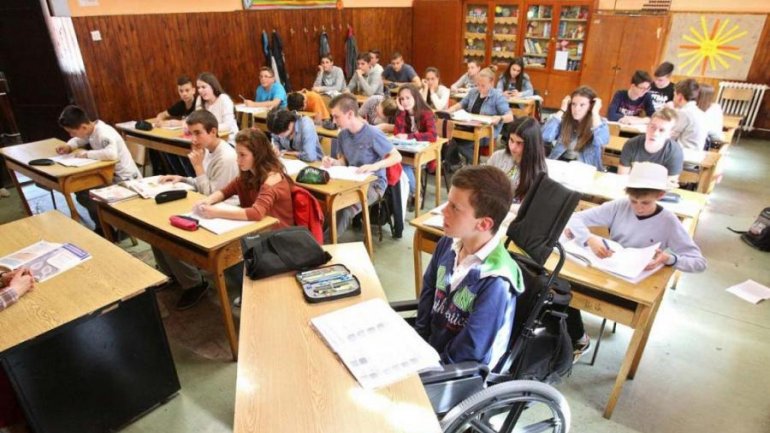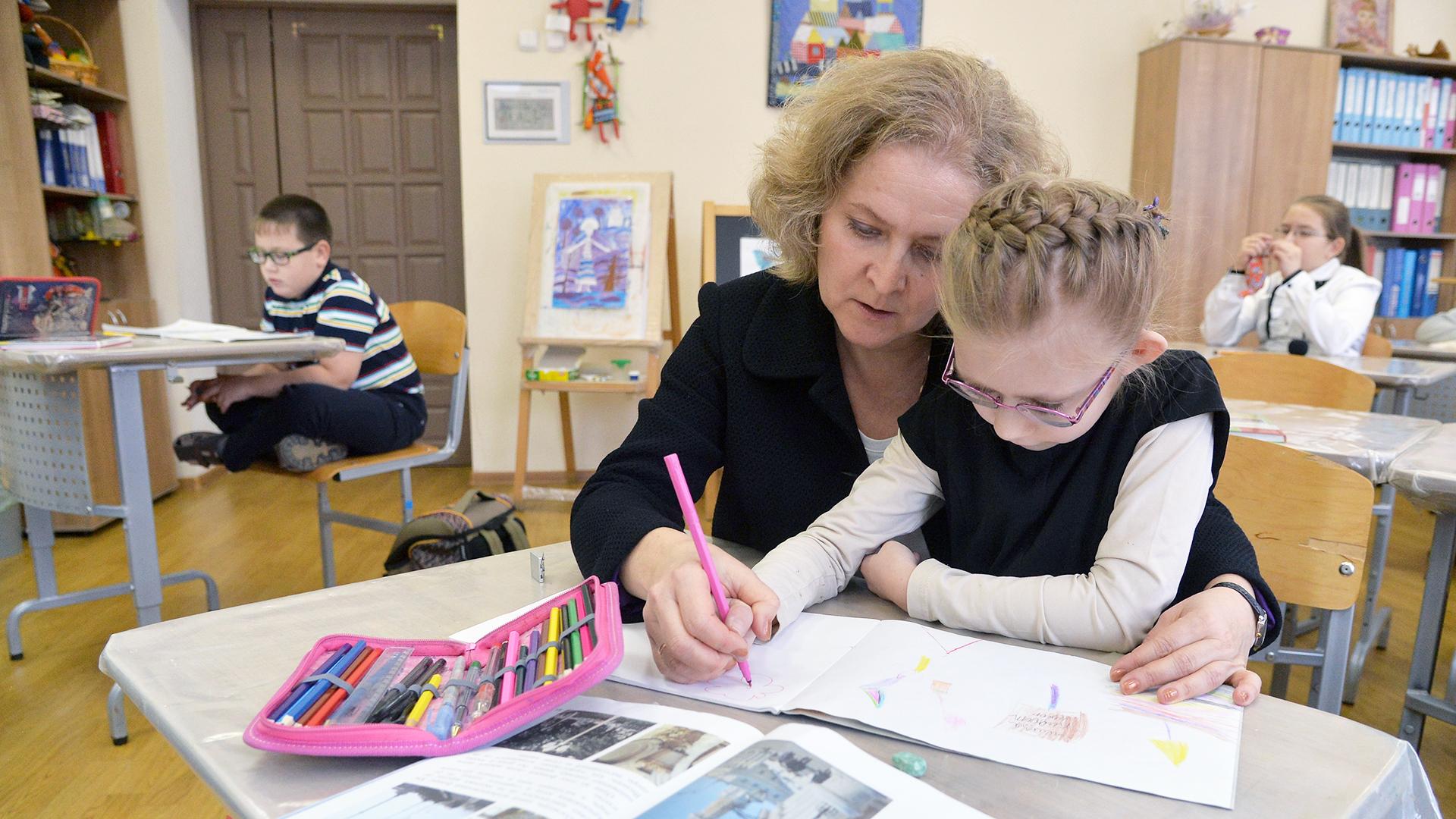Inclusion - 2020
On February 26, 2020, during a meeting of the Cabinet of Ministers in Kyiv, a Resolution was adopted determining how much money each oblast will receive for the inclusive sphere and what it will spend it on, ie local governments will have more power to redistribute subventions. Therefore, in 2020 the government sent about UAH 504 million. for the development of inclusive education in vocational education institutions, schools and kindergartens.
"Quality education should be available to every student, regardless of nationality, place of birth or the specific educational needs of the child. This is our deep conviction, and that is why we continue to consistently develop inclusive education in Ukraine. If at the beginning of 2019 we had a little more than 12 thousand children with special educational needs in inclusive classes, then at the beginning of 2020, this figure was 19,345 students. In fact, we see growth of 61.2% in 2019 alone. This is an extremely powerful and important indicator for us, "said Anna Novosad , now the former Minister of Education and Science, at the briefing .
According to the Ministry of Education and Science, local authorities will be able to spend the provided subvention on: first, payment for correctional and developmental classes and purchase of special means of correction (for inclusive school students - UAH 410.1 million, for inclusive kindergarten groups - UAH 87.5 million). UAH, students of inclusive groups of vocational education institutions, who, along with the profession, receive a complete general secondary education - UAH 4.9 million); secondly, the purchase of special means of correction for students of inclusive groups of vocational education institutions - UAH 1.8 million.
At the same time, local authorities have the power to redistribute the subvention, depending on the situation in the region.
Also, the Ministry of Education and Science of Ukraine together with the Ministry of Social Policy of Ukraine will hold approbation of the draft State standard of support during inclusive education from February 17 to June 17, 2020. 19 institutions, establishments and organizations, including institutions of social protection, education, public organizations of Vinnytsia, Dnipropetrovsk, Kharkiv regions will be involved in the approbation of the social service. The service of providing an assistant to a child with a disability for the period of study is based on the principles of targeting and individual approach.
19 institutions, establishments and organizations, including institutions of social protection, education, public organizations of Vinnytsia, Dnipropetrovsk, Kharkiv regions will be involved in the approbation of the social service. The service of providing an assistant to a child with a disability for the period of study is based on the principles of targeting and individual approach.
According to the Ministry of Social Policy, the procedure for obtaining the service is quite simple. The basis for receiving social support services during inclusive education at the expense of budget funds is the decision of the structural unit for social protection.
Parents or legal representatives of the child must obtain the opinion of the Inclusive Resource Center and write an application to the head of the selected educational institution, who independently applies to the local authority.
The social support service during inclusive education is provided by the child’s assistant after assessing his / her individual needs, drawing up an individual plan and concluding an agreement between the head of the service provider and one of the child’s parents. The assistant helps the child in self-care, supports in communication and communications (including through sign language), organizes food, movement, provides safety and health monitoring (including medication), promotes leisure and organizes day recreation. He must also act with respect for the dignity of the child, ensuring that discriminatory and inhumane acts are prevented during inclusive education. Regional centers of social services for families, children and youth should in turn train child assistants for a period of 60 academic hours.
Regional centers of social services for families, children and youth should in turn train child assistants for a period of 60 academic hours.
After approbation, the draft state standard of support during inclusive education will be finalized taking into account the real practice for its implementation throughout Ukraine.
For example, this practice has been around in Germany for a long time. Psychological and pedagogical support is provided by pedagogical centers that operate in each region, although the forms of work organization may be different. Such centers provide a variety of assistance to students with special educational needs, conduct career guidance work with them, coordinate the activities of various professionals, advise parents and teachers, and more. In addition to the centers, support for students with special needs is provided by services that operate outside schools and are funded by local governments. These are medical and social services, resource centers, rehabilitation institutions.
Such development of social services in communities, in particular, for children with disabilities, with proper financial support from the state will help ensure the best interests of the child, his socialization in society, preventing the institutionalization of children with special needs.
Author Kateryna Stebelska
Read also: Inclusion and conflicts at school: what to do for parents
"Quality education should be available to every student, regardless of nationality, place of birth or the specific educational needs of the child. This is our deep conviction, and that is why we continue to consistently develop inclusive education in Ukraine. If at the beginning of 2019 we had a little more than 12 thousand children with special educational needs in inclusive classes, then at the beginning of 2020, this figure was 19,345 students. In fact, we see growth of 61.2% in 2019 alone. This is an extremely powerful and important indicator for us, "said Anna Novosad , now the former Minister of Education and Science, at the briefing .
According to the Ministry of Education and Science, local authorities will be able to spend the provided subvention on: first, payment for correctional and developmental classes and purchase of special means of correction (for inclusive school students - UAH 410.1 million, for inclusive kindergarten groups - UAH 87.5 million). UAH, students of inclusive groups of vocational education institutions, who, along with the profession, receive a complete general secondary education - UAH 4.9 million); secondly, the purchase of special means of correction for students of inclusive groups of vocational education institutions - UAH 1.8 million.
At the same time, local authorities have the power to redistribute the subvention, depending on the situation in the region.
Also, the Ministry of Education and Science of Ukraine together with the Ministry of Social Policy of Ukraine will hold approbation of the draft State standard of support during inclusive education from February 17 to June 17, 2020.
 19 institutions, establishments and organizations, including institutions of social protection, education, public organizations of Vinnytsia, Dnipropetrovsk, Kharkiv regions will be involved in the approbation of the social service. The service of providing an assistant to a child with a disability for the period of study is based on the principles of targeting and individual approach.
19 institutions, establishments and organizations, including institutions of social protection, education, public organizations of Vinnytsia, Dnipropetrovsk, Kharkiv regions will be involved in the approbation of the social service. The service of providing an assistant to a child with a disability for the period of study is based on the principles of targeting and individual approach. According to the Ministry of Social Policy, the procedure for obtaining the service is quite simple. The basis for receiving social support services during inclusive education at the expense of budget funds is the decision of the structural unit for social protection.
Parents or legal representatives of the child must obtain the opinion of the Inclusive Resource Center and write an application to the head of the selected educational institution, who independently applies to the local authority.
The social support service during inclusive education is provided by the child’s assistant after assessing his / her individual needs, drawing up an individual plan and concluding an agreement between the head of the service provider and one of the child’s parents. The assistant helps the child in self-care, supports in communication and communications (including through sign language), organizes food, movement, provides safety and health monitoring (including medication), promotes leisure and organizes day recreation. He must also act with respect for the dignity of the child, ensuring that discriminatory and inhumane acts are prevented during inclusive education.
 Regional centers of social services for families, children and youth should in turn train child assistants for a period of 60 academic hours.
Regional centers of social services for families, children and youth should in turn train child assistants for a period of 60 academic hours. After approbation, the draft state standard of support during inclusive education will be finalized taking into account the real practice for its implementation throughout Ukraine.
For example, this practice has been around in Germany for a long time. Psychological and pedagogical support is provided by pedagogical centers that operate in each region, although the forms of work organization may be different. Such centers provide a variety of assistance to students with special educational needs, conduct career guidance work with them, coordinate the activities of various professionals, advise parents and teachers, and more. In addition to the centers, support for students with special needs is provided by services that operate outside schools and are funded by local governments. These are medical and social services, resource centers, rehabilitation institutions.
Such development of social services in communities, in particular, for children with disabilities, with proper financial support from the state will help ensure the best interests of the child, his socialization in society, preventing the institutionalization of children with special needs.
Author Kateryna Stebelska
Read also: Inclusion and conflicts at school: what to do for parents